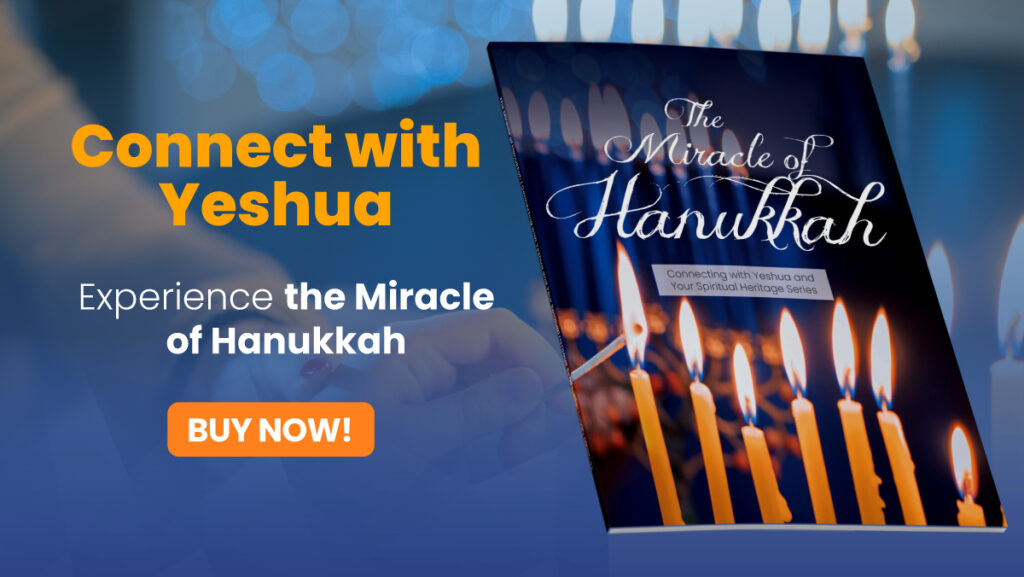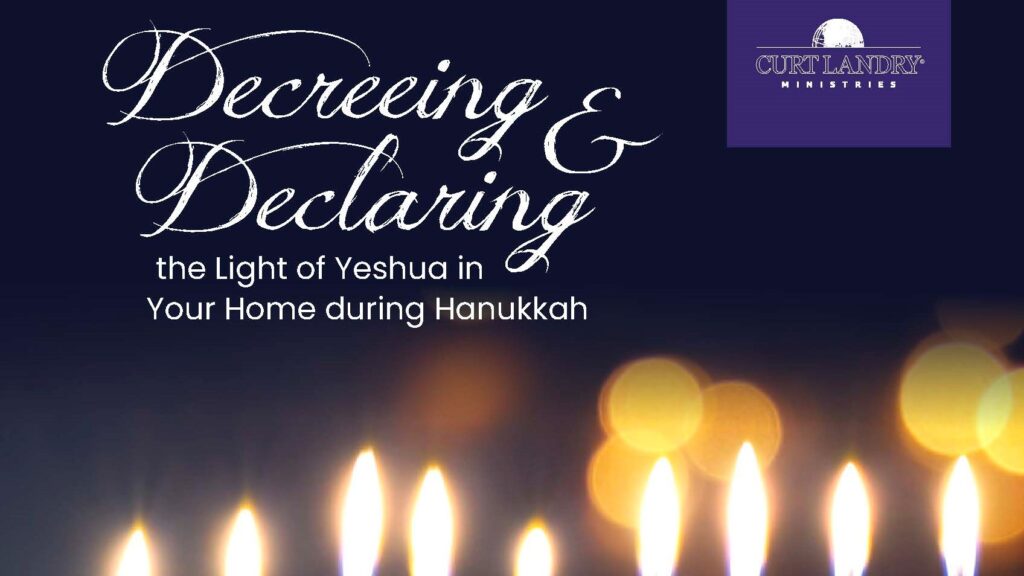How to Celebrate Hanukkah at Home | Part 1
Table of Contents
As a Believer interested in studying the roots of your faith, you want to know how to celebrate Hanukkah at home. Likewise, you want to know what this festival means for you and your family.
To do that, you must understand Hanukkah’s spiritual foundations, lessons, and prophetic significance.
Hanukkah is more than a simple observation of a festival.
When you begin to study and understand something new at a deeper level, it is wise to ask yourself…
- What is my goal in studying?
- How does this information personally apply to me?
- What new insights do I want to walk away with?
In other words, when you begin to study, you need to think in terms of ACT and GROW.
- A.C.T. – Apply. Change. Transform.
- G.R.O.W. – Goals. Reality. Opportunities. A Way Forward.
Through this 2-part series, How to Celebrate Hanukkah at Home, my hope is that:
- You better understand how the enemy operates so that you can build your personal spiritual warfare strategy (See Part 1)
- You know the purpose that light plays in Hanukkah (See Part 2)
- You thank the God of miracles for His faithfulness and provision (See Part 2)
“Or what king, going to make war against another king, does not sit down first and consider whether he is able with ten thousand to meet him who comes against him with twenty thousand?”—Luke 14:31
Before You Celebrate Hanukkah at Home…
Here are 7 basics that will help you understand the spiritual warfare depicted in the Hanukkah story.
- Hanukkah, the Festival of Lights, or Feast of Dedication, is celebrated annually on the 25th of Kislev and lasts for 8 days. It ends on the 2nd of Tevet. These dates are set on the Hebrew calendar and coincide with a November or December date on the Gregorian calendar.
- Traditionally, those who observe the festival celebrate Hanukkah at home. The festivities center around light as a symbol of spiritual freedom.
- Hanukkah remembers and celebrates the Maccabean revolt. Judah the Maccabee led a group of Jewish rebels in a battle against the oppression of Antiochus IV. For the full Hanukkah story, click HERE.
- When the Maccabees recaptured the Temple, which had been turned into a pagan shrine, they cleansed and rededicated it to the God of Israel. This rededication took place over the course of 8 days and is believed to have been patterned after Sukkot.
- Jewish scholars believe it was patterned after Sukkot because it would have been a belated Feast of Tabernacles celebration due to the fact that they were not able to observe it during the revolt.
- Rabbinic tradition also credits the 8-day celebration to the length of time the untainted oil burned in the Temple menorah. The Maccabees had only one day’s worth of pure oil, yet the supply lasted for 8 days—just enough time for more purified oil to be made according to Jewish law.
Point 7 is key to understanding Hanukkah’s prophetic significance…
- The above points are the traditional narrative. However, there is more to the story. Many modern historians believe that the battle wasn’t only between the Jews and the Greeks, but also between the traditionalist Jews and the Jews who had mixed their culture with the Greek and Syrian culture that dominated the region at that time.
In short, the Maccabean Revolt was both a spiritual and civil war.
Knowing this is key when it comes to understanding the lessons that can be learned.
3 Lessons to Learn from Hanukkah
There are many important lessons of faith for you and your families to grasp as you celebrate Hanukkah at home.
Use our A.C.T. teaching to learn these important lessons.
- First, make a choice to cut off negative habits and patterns by applying Romans 12:2.
- Second, be kings and priests by changing your behavior using James 1:22.
- Third, allow the Spirit to transform you from glory to glory using 2 Corinthians 3:18.
1. Make a choice.
Make a choice to come out of agreement with the negative habits and patterns from a Hellenized culture and system that you may have inadvertently adopted.
A Hellenized, or Greek mindset, is one that is driven by performance and reliance on false gods, mankind, and one’s inner strength. This mindset was depicted in the Greek culture by placing great value on gladiators (personal strength), philosophy (personal wisdom), the strength of logic (personal knowledge), and mythology (false gods).
Personal strength and education are not bad in and of themselves, but Greek culture placed more value on these things rather than a reliance on the One True God. There was pride in the accomplishment of who man could be and the problems he could solve, rather than trusting in the Divine.
It was this distortion of values that were creeping in and mixing into the Jewish culture and the Jewish priesthood, which sparked the revolt.
A.C.T.
Apply God’s Word
“And do not be conformed to this world, but be transformed by the renewing of your mind, that you may prove what is that good and acceptable and perfect will of God.”
—Romans 12:2
2. Be kings and priests unto God.
The priesthood during the time leading up to the revolt had become a counterfeit priesthood. It was what we would call hirelings. Those with the title of “priest” were in the priesthood for power, position, and money.
A group of Judean priests had offered to pay Antiochus IV to replace one high priest with another. Antiochus took the bribe.
Three years later, another wealthy priest, Menelaus—influenced by the Greek culture—came forward and offered even more money, which he stole from the Temple treasures, for the position.
Antiochus again took the deal.
But there was another problem, Menelaus was not from the proper family line of high priests. The conservative Jews opposed him as a radical Hellenizer. Menelaus erected a statue of Zeus (the chief figure in Greek mythology) in the Holy of Holies. He sought to Hellenize the Jews in what became known as a “reign of terror.”
Out of this situation, the Maccabean Revolt was birthed, and the miracle of Hanukkah came to pass.
Hanukkah became a powerful testimony of a small remnant making a way forward to save their identity, faith, Temple, and culture—as one that reflects the One True God of Israel.
The remnant was the priests and kings that the Lord used to restore His nation. We, too, are the kings and priests unto God in this hour (see Revelation 1:6.).
A.C.T.
Change the behavior.
“But be doers of the word, and not hearers only, deceiving yourselves.”
—James 1:22
3. Be transformed.
Understanding the Hanukkah story, along with the reality and challenges the Maccabees faced, helps you teach and apply godly wisdom. As a result, a way forward will be revealed, and transformation will take place.
Hanukkah is considered a minor holiday, but it is brimming with strategic steps to align with the ways of God so that you receive miraculous victories when you, your family, your nation, and your culture are being threatened.
Through the Maccabees’ fight, the priesthood, the Temple, and their faith were transformed.
Spiritual principles that transform…
- Fight for what you believe in. Revolts are not passive. Many times, the “revolt” takes place in the spiritual realm through prayer.
- Don’t compromise God’s instruction during the redemption process. Wait in faith on the oil that is coming.
- The remnant must be set apart and dependent upon God and His provision. Resist self-reliance, or a Hellenized mindset.
- Battle in the opposite spirit (see Matthew 12:26) when the enemy attempts to erect false gods in your temple. Opportunities for growth or progress will not present themselves until you remove the enemy from your atmosphere.
We face many of the same challenges that we see in the Hanukkah story. Similar to the Maccabees, a remnant is standing up to save the identity and culture of a nation. While we arise, we trust God for His provision and His anointing—not a man-made or self-sustained anointing oil, but a God-ordained and sanctified oil.
In biblical times, the oil was used to:
- Set apart and consecrate something
- Anoint the Temple tools for worship
- Anoint the kings and priests
Yeshua was anointed and prepared for the ultimate sacrifice (see Mark 14) right before the last Passover. Like Yeshua, we have been anointed and set apart for Kingdom service.
A.C.T.
Allow the Spirit to transform you.
“But we all, with unveiled face, beholding as in a mirror the glory of the Lord, are being transformed into the same image from glory to glory, just as by the Spirit of the Lord.”
—2 Corinthians 3:18

In Summary | How to G.R.O.W. in the Lord…
As you celebrate Hanukkah at home, remember the Maccabean Revolt was rooted in the desire to maintain true identity and defeat the foreign gods and practices that tried to comprise and confuse the Jewish people. It was as much of a spiritual war as it was a physical and civil war.
Understanding the prophetic symbolism of Hanukkah and the act of lighting the candles (discussed in Part 2) is a reminder that if we don’t maintain the purity of our oil and light, then darkness will attempt to overshadow the truth.
This is the battle that has raged since the beginning of time.
As we come out of agreement with habits and patterns from a Hellenized culture, let us move forward and G.R.O.W in the Lord by being doers of His Word and allowing the Spirit of God to transform our minds, will, and emotions into His likeness.
- Have goals that align with God’s.
- Have a grasp of the reality of the situation.
- Look for opportunities that God places in your path to apply His instruction.
- Make a way forward by moving forward in God’s ways, knowing His protection and provision cover you.

